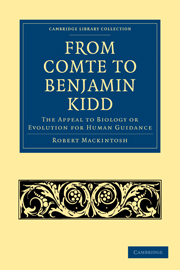Book contents
- Frontmatter
- PREFACE
- Contents
- CHAPTER I INTRODUCTORY
- PART I COMTISM, WITH SOME SCATTERED PARALLELS
- PART II SIMPLE EVOLUTIONISM—SPENCER, STEPHEN
- PART III DARWINISM, OR STRUGGLE FOR EXISTENCE
- PART IV HYPER-DARWINISM—WEISMANN, KIDD
- CHAPTER XVIII A “FAIRY TALE OF SCIENCE”?
- CHAPTER XIX HYPER-DARWINISM IN SOCIOLOGY: STRUGGLE MADE ABSOLUTE—MR. KIDD
- CHAPTER XX SUMMARY AND CONCLUSIONS
- Index
CHAPTER XIX - HYPER-DARWINISM IN SOCIOLOGY: STRUGGLE MADE ABSOLUTE—MR. KIDD
Published online by Cambridge University Press: 29 August 2010
- Frontmatter
- PREFACE
- Contents
- CHAPTER I INTRODUCTORY
- PART I COMTISM, WITH SOME SCATTERED PARALLELS
- PART II SIMPLE EVOLUTIONISM—SPENCER, STEPHEN
- PART III DARWINISM, OR STRUGGLE FOR EXISTENCE
- PART IV HYPER-DARWINISM—WEISMANN, KIDD
- CHAPTER XVIII A “FAIRY TALE OF SCIENCE”?
- CHAPTER XIX HYPER-DARWINISM IN SOCIOLOGY: STRUGGLE MADE ABSOLUTE—MR. KIDD
- CHAPTER XX SUMMARY AND CONCLUSIONS
- Index
Summary
There is a great deal to recall Comte in Social Evolution. We have a long and interesting appeal to history. We have the doctrine of altruism assumed, without inquiry or justification, as a definition of the moral ideal; though it is ousted from the place of legitimate authority which Comte gave it by Mr. Kidd's anarchical conception of reason as purely selfish, and has to borrow its credentials from non- rational religion. Above all we have the appeal to biology more unhesitating than ever. “It may be remarked that nothing tends to exhibit more strikingly the extent to which the study of our social phenomena must in future be based on the biological sciences, than the fact that the technical controversy now being waged by biologists as to the transmission or nontransmission to offspring of qualities acquired during the lifetime of the parent, is one which, if decided in the latter sense, must produce the most revolutionary effect throughout the whole domain of social and political philosophy.” Yes, it is striking; most extremely striking; so remarkably striking, indeed, that one would have expected the author to reconsider the question, whether it is necessarily true, if not to raise the question, whether it is even possibly true. Comte himself, phenomenalist to the backbone, while insisting on the connection of sociology with the lower science of biology, insisted also on its separate province and independent laws.
- Type
- Chapter
- Information
- From Comte to Benjamin KiddThe Appeal to Biology or Evolution for Human Guidance, pp. 238 - 255Publisher: Cambridge University PressPrint publication year: 2009First published in: 1899



